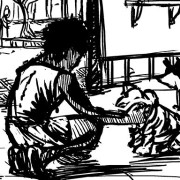|
cheerfullydrab posted:Lots of use of the "B" word on this page. I thought at least some posters called those people by their right name. Yeah all this use of the word buttsex is really bumming me out.
|
|
|
|

|
| # ? May 29, 2024 18:04 |
|
Beamed posted:Yeah all this use of the word buttsex is really bumming me out. Bugger off
|
|
|
|
Bugger-off?
|
|
|
|
Basileus Basil Brutally Buggers Bummed Bulgars By Boosting Burgeoning (But Bloated) Byzantine Bureaucracy.
Tomn fucked around with this message at 06:46 on Sep 27, 2015 |
|
|
|
Buttsex aka anal intercourse
|
|
|
|
Crossposting this here too cause I love polyremes so drat muchFishFood posted:So, here comes a post from someone without a college degree about a subject someone asked about on page 666, Classical Greek and Hellenistic naval warfare! A quick caveat, my knowledge on this area is based solely on the books that I have read, especially The Age of Titans, by William M. Murray, The Battle of Salamis, by Barry Strauss, and of course Herodotus, Thucydides and Xenophon, namely the super rad Landmark translations. Let's begin!
|
|
|
|
Everyone interested in Ancient Greece or Rome should own all the landmark series books. They are all cool and good.
|
|
|
|
Tomn posted:Basileus Basil Brutally Buggers Bummed Bulgars By Boosting Burgeoning (But Bloated) Byzantine Bureaucracy. Blimey
|
|
|
|
Tomn posted:Basileus Basil Brutally Buggers Bummed Bulgars By Boosting Burgeoning (But Bloated) Byzantine Bureaucracy. HEY GUNS fucked around with this message at 14:27 on Sep 27, 2015 |
|
|
|
Beecock
|
|
|
|
Charlie Mopps posted:Everyone interested in Ancient Greece or Rome should own all the landmark series books. They are all cool and good. I saw one at Half Price Books, but I wasn't sure I'd be into it. I like Herodotus--I have an Oxford version that has lots of end notes, and his subject matter isn't all battles. The one there--and I'm blanking on it, but it's by the guy who tried to pick up right where Thucy left off--seemed to just be minute details of ancient battles, albeit with excellent maps and notes and stuff. Is there the same kind of weird cultural stuff that there is in Herodotus and I just didn't see it? And is the Landmark version worth getting if I already have a copy of Herodotus?
|
|
|
|
A Strange Aeon posted:I saw one at Half Price Books, but I wasn't sure I'd be into it. I like Herodotus--I have an Oxford version that has lots of end notes, and his subject matter isn't all battles. The one there--and I'm blanking on it, but it's by the guy who tried to pick up right where Thucy left off--seemed to just be minute details of ancient battles, albeit with excellent maps and notes and stuff. The guy who picks up after Thucydides is Xenophon and the Landmark translations are amazing. They have extensive footnotes and appendices that are all fantastic.
|
|
|
|
FishFood posted:The guy who picks up after Thucydides is Xenophon and the Landmark translations are amazing. They have extensive footnotes and appendices that are all fantastic. Right, but the actual content of Xenophon; is it all just details of battles or is there neat cultural stuff as well like in Herodotus?
|
|
|
|
A Strange Aeon posted:Right, but the actual content of Xenophon; is it all just details of battles or is there neat cultural stuff as well like in Herodotus? Xenophon is more focused on the events and doesn't have Herodotus' great tangents on cults and giant bugs and scythian weed smoking technique. There's a lot of cool stuff if you pay attention, though, like how the Greeks take omens before they do ANYTHING and Xenophon thinks it's very important to write down every single one of these and their outcome.
|
|
|
|
FishFood posted:Xenophon is more focused on the events and doesn't have Herodotus' great tangents on cults and giant bugs and scythian weed smoking technique. There's a lot of cool stuff if you pay attention, though, like how the Greeks take omens before they do ANYTHING and Xenophon thinks it's very important to write down every single one of these and their outcome. That does sound interesting. If it's still at Half Price next time I'm there I'll probably pick it up. Paging through it briefly, it seemed to be a lot of "then we went to meet the enemy on the hill" kind of stuff, but the omens sound like something I'd be really into, especially since they are often kind of glossed over in secondary sources not devoted to such things. Will be neat to see in a primary source. Speaking of sources, in the Golden Bough there's a brief mention in the kind of plethora of throwaway details Frazier is so fond of of a dude named Sopater who was executed in Constantinople for binding the winds. I couldn't find a wiki page on this character, does anybody know the story and source?
|
|
|
|
Xenophon is indeed a lot of ''and then we walked to that place for so many days'', but you kinda have to glaze over those parts.
|
|
|
|
A Strange Aeon posted:That does sound interesting. If it's still at Half Price next time I'm there I'll probably pick it up. Paging through it briefly, it seemed to be a lot of "then we went to meet the enemy on the hill" kind of stuff, but the omens sound like something I'd be really into, especially since they are often kind of glossed over in secondary sources not devoted to such things. Will be neat to see in a primary source. That story's from a book called Lives of the Philosophers and Sophists. The TLDR version isn't that interesting, it's pretty much just that he was a dude who got promoted too fast and his enemies accused him of sorcery during a famine and got him killed. fantastic in plastic fucked around with this message at 03:32 on Sep 29, 2015 |
|
|
|
A Strange Aeon posted:That does sound interesting. If it's still at Half Price next time I'm there I'll probably pick it up. Paging through it briefly, it seemed to be a lot of "then we went to meet the enemy on the hill" kind of stuff, but the omens sound like something I'd be really into, especially since they are often kind of glossed over in secondary sources not devoted to such things. Will be neat to see in a primary source. Xenophon has lots of cool cultural tid-bits, but they are all tightly bound up in the narrative and Xenophon's perspective. For example how the Greeks select new officers after the leaders who led them into Persia are all slaughtered, or how the army and wary locals worked out the details of the markets though which the Greeks could buy supplies. I was struck by a scene that occurred in the rugged mountains of Anatolia. A local guide offers to lead the Greeks along what he promises is a prosperous route where they can easily find provisions, but when they get there they find it barren, and the locals have all retreated to a fortified mountain redoubt. With the villagers refusing to negotiate a market the Greeks are forced to assault the village or starve, and when they take it the residents, including women and children, throw themselves from the cliffs. What really hit me though was how Xenophon seemed so frustrated recording it, emphasizing how they weren't going to enslave them, that they just needed supplies to keep moving, accusing the guide of vindictively using the Greeks to destroy his local enemies. Like he regretted the whole affair, trying to justify to the reader his own part. It was just such a human reaction to one of those common-place tragedies of history modern writing glosses over and other ancient sources might even boast about.
|
|
|
|
Squalid posted:Xenophon has lots of cool cultural tid-bits, but they are all tightly bound up in the narrative and Xenophon's perspective. For example how the Greeks select new officers after the leaders who led them into Persia are all slaughtered, or how the army and wary locals worked out the details of the markets though which the Greeks could buy supplies. Yeah, Anabasis is really weird in that it's one of the first real memoirs we can get our hands on. His Hellenika has some very interesting tidbits. Xenophon isn't nearly as incisive an observer as Thucy, but once you past the first section he opens up a lot more.* When he hits his stride he starts going over the big stuff in broad strokes and then zooming in on little incidents he thinks have didactic value. Stuff like  only being king because Lysander convinced the Spartans that Alcibiades actually fathered the other potential heir. Or the discussion of the execution of the Athenian generals. There's a bit about only being king because Lysander convinced the Spartans that Alcibiades actually fathered the other potential heir. Or the discussion of the execution of the Athenian generals. There's a bit about  's son asking his dad to do a favor for his lover, which I think is super interesting because it's basically zero judgement about a more or less equitable male-to-male romance where all the actors are being motivated by love. 's son asking his dad to do a favor for his lover, which I think is super interesting because it's basically zero judgement about a more or less equitable male-to-male romance where all the actors are being motivated by love.Mostly it boils down to 'honor the gods,' 'go aristocrats, (mostly),' 'reward/pay your soldiers on time,' and 'no really, rituals are super important you guys.' I feel like he would fit in with Hegal's crowd pretty well. *I'm pretty sure it's been speculated that he wrote that first section a while before he finished the rest of the work, and he goes into so much detail of the Oligarchs in Athens getting the boot because he was probably there personally. He effaces himself throughout Hellenika, for whatever reason. That said, another bit where he gets very personal point of view is when he's discussing the Ten Thousand's (and thus his own) post-Anabasis role in an Anatolia where he discusses a female satrap getting betrayed by her son-in-law which is super interesting.
|
|
|
|
Was King Herod truly evil, or was he ruling in the fashion that was typical for his time and region? Killing people, even your own family who might assassinate you to succeed you was pretty drat common back then right? He built some amazing structures. He's referred to Herod the great. Jerusalem was a beautiful city during his time. And he was basically a puppet for the romans anyways right?
|
|
|
|
Every time I'm stuck on a plane or at a restaurant where an infant is screaming their heart out and the parents are doing nothing, I'm reminded that Herod is my favorite Bible character.
|
|
|
|
ChocNitty posted:And he was basically a puppet for the romans anyways right? That probably made all the rest look worse, actually. No one likes being ruled by a dictator propped up by a foreign empire, then or now.
|
|
|
|
What is "evil" for a prince? Anyways Herod ruled a long time and had peace. He was too cosmopolitan for reactionary Jews but seems to have been actually trying to rule a cosmopolitan kingdom. One fact that I think highlights his ability is that even though he supported Marcus Antonius in the civil wars, a triumphant Augustus did not sack him. Overall I'd say he was a good sovereign.
|
|
|
|
I've always heard that the Roman statues were painted in super gaudy primary and secondary colors and that we can tell by residue in the marble. However the the statues from Herculaneum seem to have rather realistic more subdued tones. Is it possible that the residue only shows us what paint was used int he statue's base coat and that they would layer paint to achieve a more realistic color to the statues?
|
|
|
|
It's possible but I think more likely is there were just different styles. They had realistic ones and they had the Liberace nightmares. You can see from medieval Roman art that they were totally into gaudy as gently caress stuff for at least some phases of their history.
|
|
|
|
It's no "Lives of Famous Whores" but I just found out about the Greek Anthology and was impressed by the gentle and universal take in one of the poems: "CHARITO has completed sixty years, but still the mass of her dark hair is as it was, and still upheld by no encircling band those marble cones of her bosom stand firm. Still her skin without a wrinkle distils ambrosia, distils fascination and ten thousand graces. Ye lovers who shrink not from fierce desire, come hither, unmindful of her decades." Interesting stuff I'm looking forward to exploring! Can anyone speak to the goodness or badness of the Kenneth Rexroth translation? I don't know much about the guy other than his championing of the Beats, so he seems an odd fit for a Classics translation. But maybe it's more excellent than the free version I can read online that translates the Greek into Latin for the racy bits...
|
|
|
|
A Strange Aeon posted:It's no "Lives of Famous Whores" but I just found out about the Greek Anthology and was impressed by the gentle and universal take in one of the poems: With translations, you have 1) linguistic fidelity to the source (what it actually says), 2) cultural currency as of its printing (having contemporary references and phrasing), and 3) poetic concerns (making it a good piece of poetry). You can generally only pick two to run with, so "what's good" depends on what you value in a translation. The real answer is to learn the bare minimum of the language, buy a commentary on whatever it is, and plow through it on your own, making your own translation. You will see the translations of others in a whole new way.
|
|
|
|
Battle of Red Cliffs: Winter 208/209 AD I always planned to continue these, but real life got in the way in the first half of 2015 as I was busy with job search and vacation and work and moving halfway around the planet. Now that Iím firmly ensconced in America again I thought Iíd get something quick out of the way to get back into the swing of things. First a refresher is probably in order because wow, itís been six months since I last posted on Chinese history. Things are reaaaaallly slowing down as we head into the Three Kingdoms period proper but thatís okay because the collapse of the Jin Dynasty is really too complicated to get into and weíd be heading off into the 4th and 5th centuries which just as in Western history get complicated and donít come back together into something thatís easy to treat in a narrative history of the whole region until the 76h century or so. Recap: It is the late autumn of 208 AD. The Han Dynasty, weakened by economic and court trends that saw more and more power transferred into the hands of the nobility throughout the 2nd century, plagued by rebellion in the 180s and finally falling to a military coup in 189, exists only in name. The great generals and lords of the realm have been in open civil war for twenty years. Though the balance of power is still in flux, there are already three well-defined areas of the country separated by geographic barriers. In the north China plain the warlord Cao Cao rules supreme after a long and hard-fought campaign. In the Yangtze River Delta and southward, the Marquisate of Wu under the upstart Sun family enjoys an uneasy peace with Cao Cao. In the rugged Yangtze Valley and fertile Sichuan Basin, two unaligned governors Liu Biao and Liu Zhang rule their provinces Jing and Yi respectively. Cao Cao through control of the Imperial Court, good governance and astute strategic maneuvers has united all of northern China. His territory is ostensibly the Han Empire, although the Emperor is little more than a hostage in Cao Caoís capital of Xuchang after the inner circle of the Imperial Court was implicated in an attempt to assassinate Cao Cao in the early 200s. Liu Bei, at the time a general under Cao Cao but now a frontier general in Jing Province under Liu Biao was also implicated in the assassination plot. Sun Quan, thrust into command of Wu at the age of 18 by the assassination of his elder brother Sun Ce in 202, has spent six years consolidating his control of Wu with the help of his mother. He is finally ready to absorb new lands and has marched into northeast Jing Province at the head of an army under the excuse of taking revenge for his fatherís death. Liu Biao died of old age mere weeks before Sun and Caoís forces arrive in Jing, leaving his son Liu Cong to face a determined coup attempt by the experienced general Liu Bei and his soldiers and supporters. Liu Bei cannot reconcile himself to the reunification of the Han Empire under Cao Cao, since Cao Cao will certainly have him executed should he fall into the hands of the Han armies. Although Liu Cong has fled to Cao Cao for protection and seems happy to accept his overlordship, Liu Bei must organize a defense of Jing or die. Jing Province is centrally located in China, in modern day Hubei and Hunan provinces. If Cao Cao can cross the Yangtze River with his army, he will have access to the extremely rugged and difficult terrain of Jing, Yi (Sichuan) and the Yangtze Valley by river transport. The size of Cao Caoís army and state virtually guarantees that he will reunify China if he can gain access to the Yangtze. Thus Liu Beiís immediate goal of preventing Cao Cao from conquering so that he can keep his head will have far-reaching consequences. A Map  Order of Battle: Cao Cao: 220,000 infantry and cavalry with a strong cavalry corps (later, a large fleet) Liu Bei: 20,000 infantry with some cavalry Sun Quan: 30,000 infantry, marines, and cavalry, with a substantial fleet Red Cliffs opened with Cao Cao approaching the Yangtze River from the north with a force modern historians accept at about 220,000 infantry and cavalry, 80,000 of which were auxiliaries recruited from Jing province itself. You might think that the loyalty of these men would be questionable, but remember that Jingís de jure ruler, Liu Cong, was actually on Cao Caoís side. These man can be thought of as Jing Provinceís soldiers, since Liu Bei has just attempted a coup with his frontier garrison. Cao Caoís force could be expected to contain a core of hardened veterans, especially veteran cavalrymen, from his campaigns in the north and east over the last eighteen years. Liu Bei begins the campaign at the fortress of Xiangyang on the Han River (a major tributary of the Yangtze) in northern Jing. The garrisons of Xiangyang and Jiangling will not be able to withstand Cao Caoís 220,000-strong army. Liu Bei sends a detachment down the river to ask Sun Quan for an alliance and advance cavalry force to the fortress of Jiangling some 150 kilometers south on the Yangtze River to raise whatever troops are available. By the time of the battle Liu Bei has managed to preserve and gather something like 20,000 men. Sun Quan marches into northeastern Jing with an army of 30,000. These troops would be thoroughly accustomed to river transport, marine operations, and just living and working on boats which is a routine part of life in the Yangtze River delta region. The Battle: Cao Caoís force captured Xiangyang and marched hard attempting to capture Liu Bei as he fled to Jiangling. Cao Caoís cavalry succeeded in capturing most of Liu Beiís column at the brief Battle of Changban but Liu Bei managed to escape down the river. Heavy winter rains in the subtropical climate damaged the roads and hampered movement for the large Han army, but Cao Cao was eventually able to capture the fortress of Jiangling. Jiangling had a large fleet at the river fortress, and gave it up to Cao Caoís army when they arrived. Cao Cao crossed the river at Jiangling, probably intending to attack the bases at Xiakou and Fankou to the east on the south bank. Sun Quanís forces, headed by the general Zhou Yu, linked up with Liu Bei and his men further down the Yangtze at Fankou. Both sides embarked on their fleets over the following days, although part Cao Caoís forces probably would have been forced to try to follow along on foot. The area was wet and marshy at this time of year, causing serious supply and movement problems for the larger force. The allied fleet sailing upriver met the Han fleet sailing downriver near some place called Red Cliffs (the location of the battle is disputed) and a skirmish ensued in which neither side gained a clear advantage. Both sides disengaged without suffering much casualties. Cao Caoís ships turned around and sailed north to link up with the army at Wulin, which was presumably a dry place to stay. The dryness and elevation of the area probably meant that the river was fairly narrow at that point, owing to the titular red cliffs. In describing naval battles itís always worth talking about the environmental circumstances. Cao Caoís fleet was large and anchored on a fairly narrow section of river. The ships were secured to each other by chains and ropes. The wind was in the southeast, which combined with the current flowing downstream to the south and east gave both fleets easy mobility up and down the river. In contrast, the area on land was hilly and marshy in the low areas, and difficult to move through especially in the rainy winter weather. Because of the bad camping conditions, many of the Han forces were living on board the fleet while it was moored in the river. Seeing a Han tactical error, the allied forces prepared and executed a fire ship attack while lulling Cao Cao into a false sense of security by sounding him out with terms of surrender. The fire ship attack was devastating to the Han ships moored to each other with chains. The northern landsmen were unable to free the ships in time and the entire fleet caught fire, many with their troops still embarked on them. A very large number of men burned to death or drowned. The allies followed up this shocking stroke with a cavalry attack on the Han camp, and the Han army was completely routed. As in most campaigns, the retreat was the most destructive phase of the battle. Cao Caoís very large army was forced to retreat through the marshes and along rained-out roads with a supply train in chaos and constant allied cavalry harassment. Since the allies now had total control of the river, they were able to mount raids from both the Yangtze to the north and tributaries to the south of the retreating Han armies. The Han forces had no way to catch the raiders once they reached their boats. The tactical situation shortly became completely hopeless. Cao Caoís army suffered badly on this retreat. They were forced to abandon supplies, wounded and sick soldiers, and no doubt armor and weapons in the mud. The way was hampered by constant stops to bridge the totally washed-out sections of road with planks and eventually bundles of straw. Although the total casualty figures are not recorded, no doubt thousands or tens of thousands of men drowned, succumbed to wounds, starved or deserted on the retreat through the marshes. When the Han army finally reached Jiangling and crossed back to the north bank and its supply base, it was badly reduced. The allied army attempted to crush the retreating forces once and for all at Jiangling, but due to divided command and a lack of ships was unable to catch Cao Caoís army. However another allied detachment to the north on the Han river threatened to cut off the line of retreat to Xiangyang, and the Han army was forced to fight its way back to the Han river and out of Jing province lest it be cut off completely. The campaign was a strategic disaster for Cao Cao, who had lost a large part of his army and been decisively repulsed from the Yangtze River. His plans to reunite the empire were dashed; without control of the Yangtze River, the way to Sichuan and the Yangtze Delta remained barred by formidable natural barriers. It was however not an existential crisis for his empire, and the status quo ante still saw him as the largest power in China. For Sun Quan and Liu Bei, the victory allowed them to reshape southern China as they saw fit, as long as they could coexist in peace. Spoiler alert: they canít. In the long run, the outcome at Red Cliffs is a turning point for Chinese history. Had Cao Cao gained control of the river, as he seemed poised to do after capturing the fleet at Jiangling, Jing and Yi provinces would probably have been forced to capitulate to him. Wu would have been in a poor strategic position within a few years and likely would have negotiated some sort of integration back into the Han/Wei state. China might have been unified again, the Sima family might never seize the throne from the Caos and the extraordinary strokes of bad luck at the beginning of the Jin dynasty might never have happened. China might have remained unified for another hundred years or more. Without a real pitched battle to mark such an important strategic turn, itís no wonder Red Cliffs has been so heavily fictionalized and embellished. Notes: There was actually not that much of a battle at Red Cliffs. Had there been a pitched battle Cao Cao undoubtedly would have won. His veteran cavalry and huge army guaranteed it. Instead, the massive stroke of burning Cao Caoís fleet with many of the soldiers still on board caused the Han army to disintegrate, and it was subsequently picked apart in the long drawn-out exploitation phase of the battle where the allies small numbers and mobility became an asset. Many incidents from the battle that you may remember from TV or books are fictional. Zhuge Liangís arrow ploy, Liu Bei throwing a baby etc. are all fictional incidents. Liu Beiís family made it out of Xiangyang without his generals having to fight their way to them at all. There were no open plains on which to fight a pitched battle in the area, and Cao Cao probably should have recognized that. He was no doubt overconfident; crossing to the south of the river during the rainy season only days after securing the fleet and fortress at Jiangling was an unforced error. Had Cao Cao settled into the strong positions at Jiangling and Xiangyang and resumed the campaign in the spring itís hard to see how the allied forces could have stopped him, even with a few more months to prepare. Instead he pressed on as if he could use his numbers to crush his enemies, ignoring the bad terrain that prevented exactly that. Arglebargle III fucked around with this message at 16:22 on Oct 2, 2015 |
|
|
|
Great post, as usual! Yet another battle from RotK makes sense now
|
|
|
|
I'm surprised this one wasn't censored in Latin. Eratosthenes Scholasticus wrote: "Let males be for others. I can love but women, whose charms are more enduring. There is no beauty in youths at the age of puberty; I hate the unkind hair that begins to grow too soon." Yuck. I did take a few years of Latin in high school, but other then some English vocabulary I doubt I've retained much. Is there a Rosetta Stone type thing to learn Latin or since it's not really spoken is the preferred teaching method different?
|
|
|
|
rosetta stone's terrible anyway, just enroll in a college course as a non-degree-seeking student or something
|
|
|
|
Rosetta Stone is really bad. EdX might have a Latin course. You could probably just learn from a book though since you don't need to learn conversation. 
|
|
|
|
HEY GAL posted:rosetta stone's terrible anyway, just enroll in a college course as a non-degree-seeking student or something This is a good idea. Also, with Greek and Latin, it is not so much about retaining words as retaining how the languages work, and knowing how to look things up when you don't know what you're looking at (Greek especially). The "preferred teaching method" is "controversial" as some people believe it's best to teach ancient languages as modern ones, with oral production of new sentences and stuff, and others believe in the passive format, where you read and translate increasingly complex things over and over. Of the two, you can totally just teach yourself the latter way, and there are introductory texts that will literally walk you through this process. Most modern texts will have you baby-stepping up to being able to read a classical text. With a commentary geared toward a learning reader, they'll gloss more hard stuff for you, too, or explain what kind of ablative construction you're looking at or w/e. You can do it, A Strange Aeon!
|
|
|
|
homullus posted:This is a good idea. Also, with Greek and Latin, it is not so much about retaining words as retaining how the languages work so if you want to learn, for some reason, lithuanian in the future? you'll have a leg up on everyone else or german i guess, which is a place where people write angry books about the genitive case
|
|
|
|
HEY GAL posted:which in turn will help you think about how other indo-european languages work And does not help one loving bit when learning Asian languages!  
|
|
|
|
Grand Fromage posted:And does not help one loving bit when learning Asian languages! sanskrit, eat my dick nerd
|
|
|
|
India doesn't count.
|
|
|
|
|
|
|
|
Grand Fromage posted:India doesn't count. 'Asian' defaults to implying 'Indian subcontinent' in some parts of the world. And lots of people from there speak Hindi or Urdu if you want actual languages modern people speak!
|
|
|
|

|
| # ? May 29, 2024 18:04 |
|
A Strange Aeon posted:I'm surprised this one wasn't censored in Latin. I've gotten through about the first 200 pabes of Lingua Latina by Orberg. It basically tries to teach latin without ever translating it into another language. I think it's really fun.
|
|
|



































